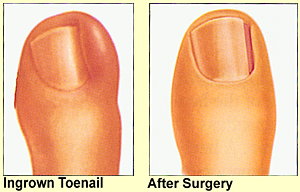Tuesday, September 14, 2010
Ingrown Toenails
When a toenail is ingrown, the nail is curved downward and grows into the skin, usually at the nail borders (the sides of the nail). This "digging in" of the nail irritates the skin, often creating pain, redness, swelling, and warmth in the toe. If an ingrown nail causes a break in the skin, bacteria may enter and cause an infection in the area, which is often marked by drainage and a foul odor. However, even if your toe isn't painful, red, swollen, or warm, a nail that curves downward into the skin can progress to an infection.
What causes an Ingrown Toenail?
Ingrown toenails can develop for various reasons. In many people, the tendency to have this common disorder is inherited. In other cases, an ingrown toenail is the result of trauma, such as stubbing your toe, having an object fall on your toe, or engaging in activities that involve repeated pressure on the toes, such as kicking or running. The most common cause of ingrown toenails is improper trimming. Cutting your nails too short encourages the skin next to the nail to fold over the nail. Another cause of ingrown toenails is wearing shoes that are too tight or too short. If you have a certain nail condition, such as toenail fungus, or have lost a toenail through trauma, you are at greater risk for developing an ingrown toenail.
Treatment for Ingrown Toenails.
Sometimes initial treatment for ingrown toenails can be safely performed at home. However, home treatment is strongly discouraged if you suspect you have an infection, or if you have a medical condition that puts your feet at high risk. Examples of conditions in which a person should not treat their ingrown toenail at home is Diabetes, Nerve damage in the foot, or poor circulation.
Preventing Ingrown Toenails.
*Trim your toenails properly. Cut your toenails in a fairly straight line, and don't cut them too short. You should be able to get your fingernail under the sides and end of your nail.
*Avoid poorly-fitting shoes. Don't wear shoes that are too short or too tight in the toe box. Also avoid shoes that are loose, because they too cause pressure on your toes when you walk briskly or run.
Tuesday, September 1, 2009
Congratulations!
Tuesday, August 18, 2009
Whats that bump on my foot?
One main problem I see many women coming into the office is bunions. Bunions are often described as a bump on the side of the big toe. The visible bump actually reflects the change in the bony framework of the front part of the foot. With a bunion, the big toe leans toward the second toe more, rather than pointing straight ahead. This change throws the bones out of alignment producing the bunion’s “bump.”
Although wearing inappropriate shoes that crowd the toes won’t actually cause bunions in the first place, it sometimes makes the deformity become progressively worse. In other words, sometimes wearing these types of shoes could cause you to experience the symptoms of the bunion sooner.
Bunion symptoms include:
- Pain or soreness at the site
- pain from wearing shoes that crowd your toes
- Calluses on the big toe or sores between the toes
- Restricted motion of the toe
- A burning sensation after pressure on the bunion
Sunday, August 2, 2009
Sunscreen on Your Feet?
Doctors urge sunscreen use and exams to prevent skin cancer on feet
When at the lake or the pool, we all lather up with the sunscreen to protect our skin from the harmful rays of the sun. But do we remember to apply sunscreen to our feet? Many don't realize that skin cancer can occur on the feet from unprotected sun exposure, and overlook applying sunscreen to the area. But, Dr. Neuhaus warns that skin cancer of the foot is prevalent and can even be fatal if not caught early.
While all types of skin cancer, including squamous cell and basal cell carcinoma, can be found on the foot, the most common is the most serious form, melanoma. Symptoms can be as subtle as an abnormal-looking mole or freckle found anywhere on the foot, and often go unnoticed without routine foot exams. Early diagnosis is the key to effective treatment for the skin condition. However, because people aren't looking for the early warning signs or taking the same precautions they do for other areas of the body, often times skin cancer in this region is not diagnosed until later stages.
Wednesday, July 22, 2009
Concerns For the Summer
Summer is here and the beach is on a lot of peoples mind. With that there is a surge on outdoor and fitness activities. After the winter season, many people have an increase in injuries when activities are started. It is important that everyone takes some proper precautions when enduring outdoor activities.
Upon starting any new routine, it is important do not jump right in. There should be a gradual increase to the desired level of activity. Stretching is also imperative to prevent strain to the muscles and tendons, especially the Achilles tendon and plantar fascia. Proper warm up routines and cool down routines are essential for preventing injuries.
Proper footwear is also recommended to prevent any unnecessary injuries. When working out, walking, or playing any sports in the wrong foot gear can lead to the development of plantar fasciitis or sprained ankles. Running or walking sneakers should be used for walking, light bike riding or jogging. For any activities that involve jumping or landing such as volleyball or basketball, high-tops should be worn to prevent rolled ankles. Playing soccer and baseball or any field activities, cleats should be worn to avoid slipping. Plantar fasciitis, Achilles Tendonitis and Ankle sprains are some of the most common foot complaints that we see in the office this time of year. Early treatment can decrease the downtime and allow a quick return to the desired activity.
Tuesday, July 21, 2009
"Keeping Nashville on Their Feet"
Dr. Neuhaus is teaming up with his son, Ryan of Troup 37, who is working on his Eagle Scout project "Keeping Nashville on Their Feet," which a community service program to help collect shoes in good condition for the needy and then be delivered to The Nashville Rescue Mission. Men's athletic shoes, casual shoes, and work boots are most needed. Our goal is 500 collected shoes but we hope to make this an ongoing program with the help of the community. Shoe donation receptacles are located in Smyrna at the offices of: Neuhaus Foot & Ankle, Dhar Family Medicine, Fresenius Dialysis Clinic, DaVita Dialysis Clinic, Smyrna Rexall Drugs, StoneCrest Physical Medicine and Rehabilitation Center, StoneCrest Family Physicians, and Tennessee Medicine and Pediatrics.
Monday, July 13, 2009
Ankle Sprains
An ankle sprain is an injury to one or more ligaments in the ankle, usually on the outside of the ankle. The severity of an ankle sprain depends on whether the ligament is stretched, partially torn, or completely torn, as well as on the number of ligaments involved. Sprained ankles often result from a fall, a sudden twist, or a blow that forces the ankle joint out of its normal position. Ankle sprains commonly occur while participating in sports, wearing inappropriate shoes, or walking or running on an uneven surface. Even if you do not have pain or swelling with a sprained ankle, treatment for the injury is crucial. If you suspect that you are suffering from an ankle sprain, before seeing Dr. Neuhaus you would need to complete the R.I.C.E. method. This means: rest, ice, compression, and elevate. This will help reduce the pain, swelling, and further injury.
Interesting Fact: More than 25,000 people sprain their ankle each day, making sprained ankles account for approximately 1/4th of all sports-related injuries and the most common musculoskeletal injury seen by physicians caring for active youngsters and adults.
To learn more about ankle sprains, you can either visit our website at www.neufoot.com or subscribe to our monthly newsletter by sending an e-mail to drneuhaus@neufoot.com.
Sunday, June 28, 2009

Monday, June 22, 2009
Complimentary Foot Book
Monday, June 15, 2009
Just a little about the doctor.
Dr. Neuhaus is originally from Madison, Wisconsin. He has been in private practice in the Nashville surrounding area since 2003. He earned his Bachelor of Science degree from Brigham YOung University in 1996. He completed his medical education, with honors, at the California College of Podiatric Medicine in San Francisco, California in 2000. His 4th year of podiatric medical school was spent in San Antonio, Texas at the University of Texas Health Science Center-San Antonio and the Texas Diabetes Institute where he received extensive training in the diabetic foot. Dr. Neuhaus then went on to Louisville, Kentucky where he completed a 3 year residency in reconstructive foor and ankle surgery at the Kentucky Podiatric Residency Program in association with the University of Louisville. Dr. Neuhaus is fluent in Spanish after having lived in Spain for two years as a missionary. He is married to his high school sweetheart, Allyson, and together they have 8 children. He is active in the community as a memboer of both the Smyrna Rotary Club, Rutherford Chamber of Commerce, and Rutherford Senior Connections. He enjoys coaching his children's youth sports teams and being involved with church activities and the Boy Scouts of America as a scoutmaster. He is an associate of the American College of Foot and Ankle Surgeons as well as a member for the American Podiatric Medical Association and the Tennessee Podiatric Medical Association.


